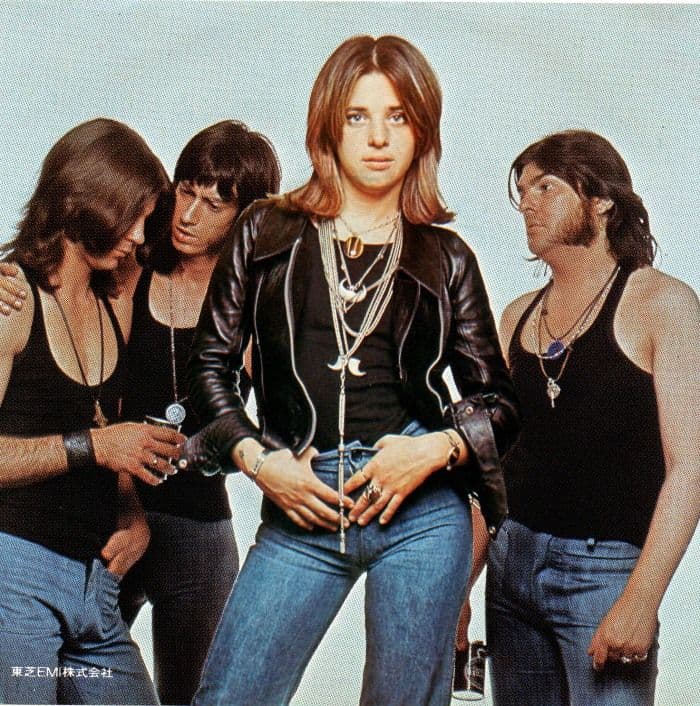
Suzi Quatro’s “Glycerine Queen”: A Raw Anthem of Feminine Power and Rock ‘n’ Roll Rebellion
Ah, dear reader, cast your mind back to a time when the air crackled with the raw energy of rock and roll, when a leather-clad figure burst onto the scene, shattering expectations and carving her own path. We’re talking, of course, about the incomparable Suzi Quatro, and the song that often comes to mind when we recall her early, electrifying impact is the visceral, unadulterated track, “Glycerine Queen.” This wasn’t just a song; it was a statement, a declaration of independence from a woman who was a true pioneer in a male-dominated world.
“Glycerine Queen” was released in 1973 as a single, though it didn’t achieve the same commercial chart success as some of her later, more pop-oriented hits. While precise chart positions for this particular single in all territories are a bit elusive, especially compared to the behemoths like “Can the Can” or “48 Crash,” it was a crucial stepping stone in establishing Suzi Quatro’s rock credentials. It often found its home on the B-side of other singles or as an album track, solidifying her reputation as a formidable force to be reckoned with. Its real impact wasn’t measured in billboard numbers as much as it was in the seismic shift it represented in the landscape of rock music. It was a defiant roar, a prelude to the chart-topping success that would soon follow.
The story behind “Glycerine Queen” is intrinsically linked to Suzi Quatro herself and the burgeoning glam rock scene of the early 1970s. After years of honing her craft in Detroit with her sisters in The Pleasure Seekers and Cradle, she made the bold move to the UK at the urging of legendary producer Mickie Most. Most saw in Suzi something truly special – a magnetic stage presence, an undeniable talent, and an authentic rock and roll spirit that was largely absent from female artists at the time. “Glycerine Queen,” along with other early tracks, was a testament to Most’s vision and Suzi’s unwavering commitment to her artistic identity. It was a collaborative effort, often written by Suzi in conjunction with her band members, capturing the raw, untamed energy of their live performances. This wasn’t a manufactured pop star; this was a genuine rock and roll animal.
The meaning of “Glycerine Queen” is multifaceted, yet at its core, it’s an anthem of empowerment and self-possession. The “Glycerine Queen” can be interpreted as a symbol of someone who is outwardly tough, perhaps even a bit hardened, but also possesses a certain allure and magnetism. It speaks to a persona that is unyielding, unafraid to challenge norms, and fully in control of her own destiny. The lyrics, while perhaps not as overtly narrative as some songs, evoke a sense of defiance and confidence. It’s about owning your power, embracing your unique identity, and perhaps even a subtle nod to the gritty, industrial landscape of her Detroit roots. For many listeners, particularly young women, Suzi Quatro was the Glycerine Queen – a figure of strength and rebellion who proved that women could not only play rock and roll, but could dominate it. She wasn’t singing about being a damsel in distress; she was singing about being the one in charge.
For those of us who came of age during that vibrant era, “Glycerine Queen” evokes a powerful sense of nostalgia. It takes us back to a time when music felt dangerous, exciting, and utterly liberating. You can almost feel the sticky floor of a smoky club, the thumping bass resonating through your chest, and the sheer exhilaration of watching Suzi Quatro command the stage with her bass slung low, a beacon of unapologetic rock and roll. It wasn’t just the music; it was the attitude, the style, the breaking down of barriers. Suzi Quatro didn’t ask for permission; she demanded attention, and with songs like “Glycerine Queen,” she earned every bit of it. It’s a testament to her enduring legacy that even now, decades later, this song still feels as potent and relevant as it did all those years ago. It’s a reminder that true artistry, courage, and a whole lot of rock and roll spirit never truly fade away.